Business Ethics: An Analysis of Coca-Cola's Ethical Practices Report
VerifiedAdded on 2023/01/11
|7
|1784
|51
Report
AI Summary
This report critically analyzes the business ethics of the Coca-Cola Company, focusing on its adherence to ethical principles in the global market. It examines the company's controversies, particularly concerning water stewardship and its impact on communities, highlighting the importance of ethical conduct and stakeholder consideration. The report discusses ethical decision-making frameworks, including the Golden Rule and the 'light of day' test, and explores the application of virtue ethics in business. It also evaluates Coca-Cola's efforts in water management, identifying shortcomings and suggesting improvements such as rainwater harvesting and enhanced stakeholder engagement. The report emphasizes the need for corporate social responsibility, the consideration of stakeholder opinions, and the implementation of ethical solutions to ensure long-term sustainability and positive societal impact.
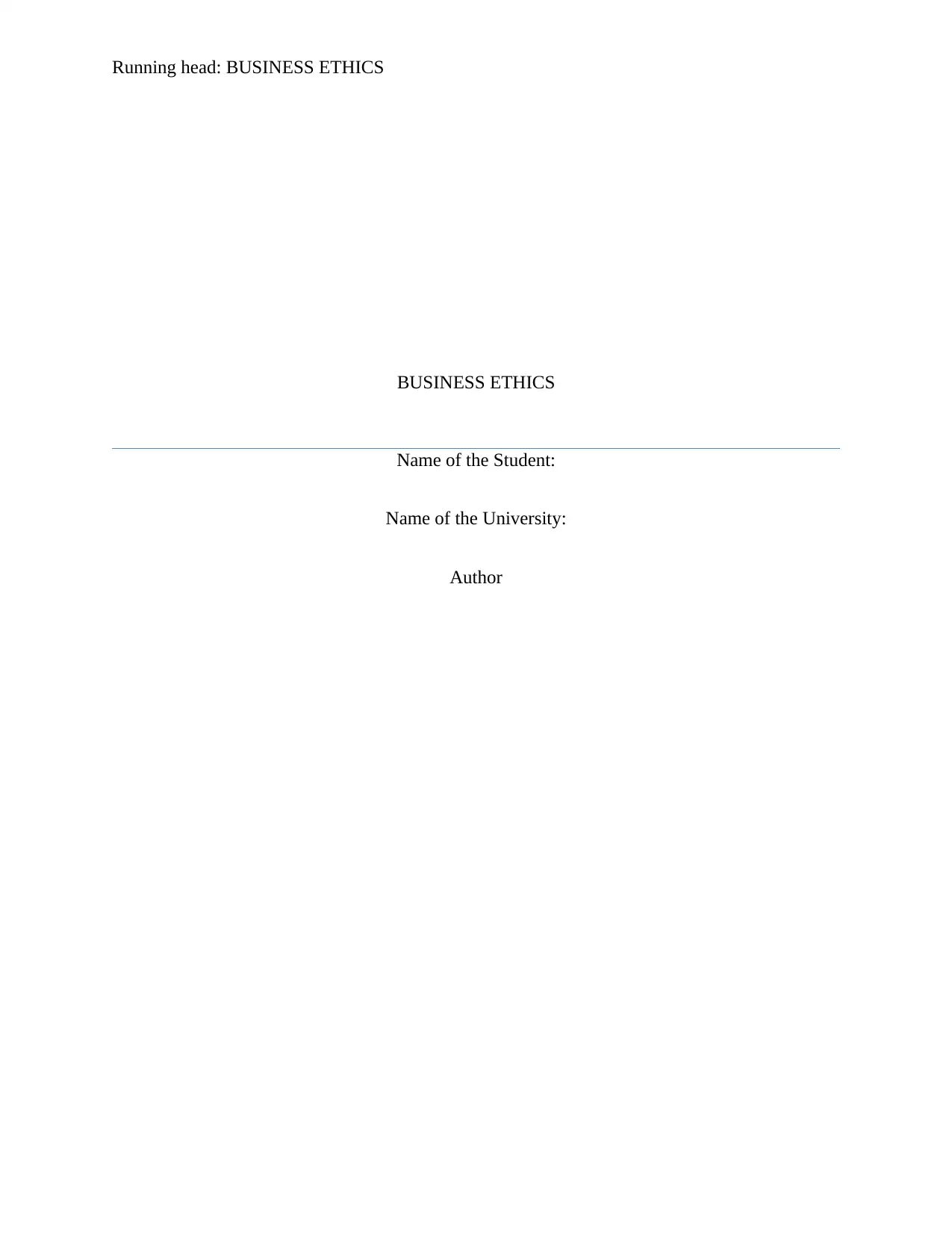
Running head: BUSINESS ETHICS
BUSINESS ETHICS
Name of the Student:
Name of the University:
Author
BUSINESS ETHICS
Name of the Student:
Name of the University:
Author
Secure Best Marks with AI Grader
Need help grading? Try our AI Grader for instant feedback on your assignments.
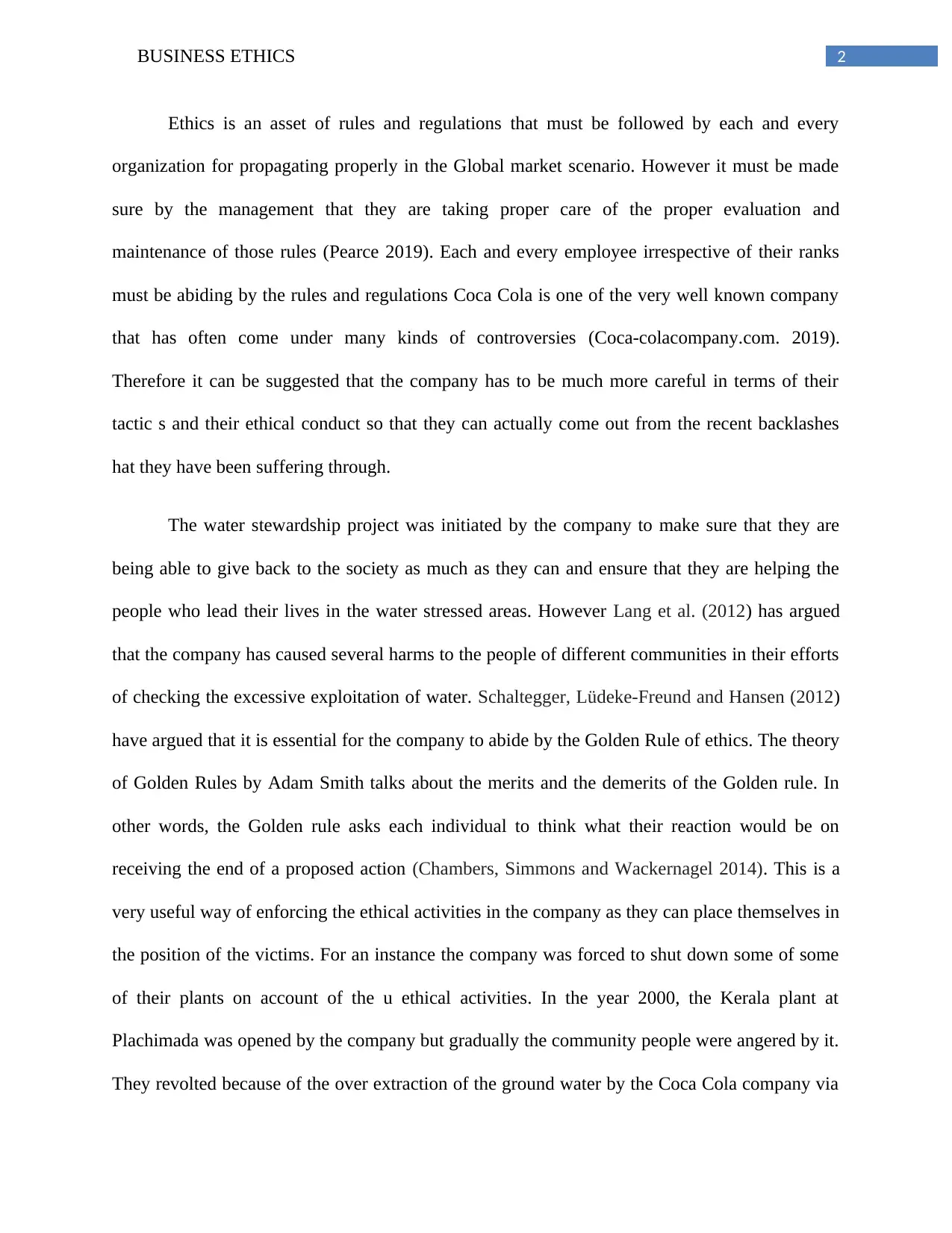
2BUSINESS ETHICS
Ethics is an asset of rules and regulations that must be followed by each and every
organization for propagating properly in the Global market scenario. However it must be made
sure by the management that they are taking proper care of the proper evaluation and
maintenance of those rules (Pearce 2019). Each and every employee irrespective of their ranks
must be abiding by the rules and regulations Coca Cola is one of the very well known company
that has often come under many kinds of controversies (Coca-colacompany.com. 2019).
Therefore it can be suggested that the company has to be much more careful in terms of their
tactic s and their ethical conduct so that they can actually come out from the recent backlashes
hat they have been suffering through.
The water stewardship project was initiated by the company to make sure that they are
being able to give back to the society as much as they can and ensure that they are helping the
people who lead their lives in the water stressed areas. However Lang et al. (2012) has argued
that the company has caused several harms to the people of different communities in their efforts
of checking the excessive exploitation of water. Schaltegger, Lüdeke-Freund and Hansen (2012)
have argued that it is essential for the company to abide by the Golden Rule of ethics. The theory
of Golden Rules by Adam Smith talks about the merits and the demerits of the Golden rule. In
other words, the Golden rule asks each individual to think what their reaction would be on
receiving the end of a proposed action (Chambers, Simmons and Wackernagel 2014). This is a
very useful way of enforcing the ethical activities in the company as they can place themselves in
the position of the victims. For an instance the company was forced to shut down some of some
of their plants on account of the u ethical activities. In the year 2000, the Kerala plant at
Plachimada was opened by the company but gradually the community people were angered by it.
They revolted because of the over extraction of the ground water by the Coca Cola company via
Ethics is an asset of rules and regulations that must be followed by each and every
organization for propagating properly in the Global market scenario. However it must be made
sure by the management that they are taking proper care of the proper evaluation and
maintenance of those rules (Pearce 2019). Each and every employee irrespective of their ranks
must be abiding by the rules and regulations Coca Cola is one of the very well known company
that has often come under many kinds of controversies (Coca-colacompany.com. 2019).
Therefore it can be suggested that the company has to be much more careful in terms of their
tactic s and their ethical conduct so that they can actually come out from the recent backlashes
hat they have been suffering through.
The water stewardship project was initiated by the company to make sure that they are
being able to give back to the society as much as they can and ensure that they are helping the
people who lead their lives in the water stressed areas. However Lang et al. (2012) has argued
that the company has caused several harms to the people of different communities in their efforts
of checking the excessive exploitation of water. Schaltegger, Lüdeke-Freund and Hansen (2012)
have argued that it is essential for the company to abide by the Golden Rule of ethics. The theory
of Golden Rules by Adam Smith talks about the merits and the demerits of the Golden rule. In
other words, the Golden rule asks each individual to think what their reaction would be on
receiving the end of a proposed action (Chambers, Simmons and Wackernagel 2014). This is a
very useful way of enforcing the ethical activities in the company as they can place themselves in
the position of the victims. For an instance the company was forced to shut down some of some
of their plants on account of the u ethical activities. In the year 2000, the Kerala plant at
Plachimada was opened by the company but gradually the community people were angered by it.
They revolted because of the over extraction of the ground water by the Coca Cola company via
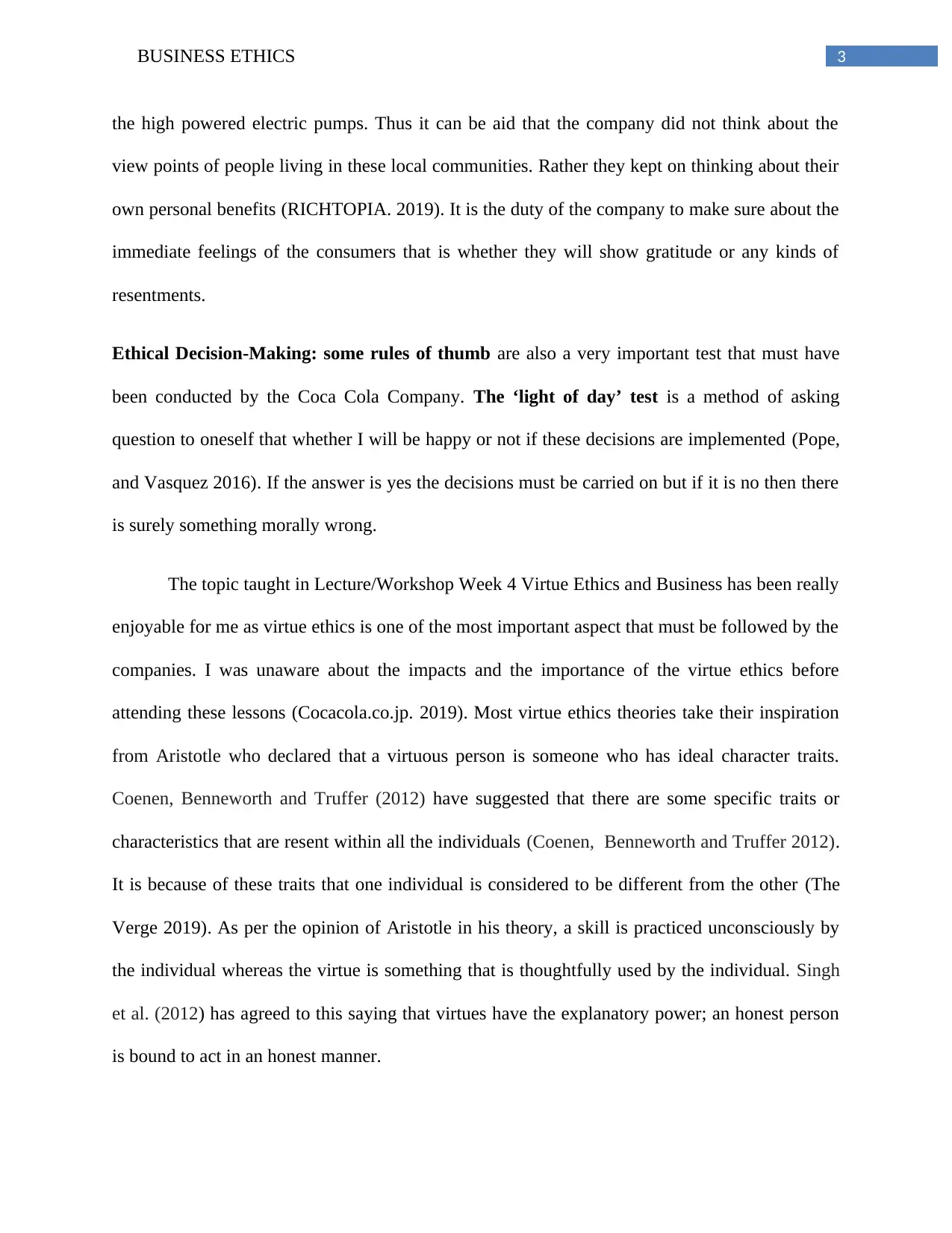
3BUSINESS ETHICS
the high powered electric pumps. Thus it can be aid that the company did not think about the
view points of people living in these local communities. Rather they kept on thinking about their
own personal benefits (RICHTOPIA. 2019). It is the duty of the company to make sure about the
immediate feelings of the consumers that is whether they will show gratitude or any kinds of
resentments.
Ethical Decision-Making: some rules of thumb are also a very important test that must have
been conducted by the Coca Cola Company. The ‘light of day’ test is a method of asking
question to oneself that whether I will be happy or not if these decisions are implemented (Pope,
and Vasquez 2016). If the answer is yes the decisions must be carried on but if it is no then there
is surely something morally wrong.
The topic taught in Lecture/Workshop Week 4 Virtue Ethics and Business has been really
enjoyable for me as virtue ethics is one of the most important aspect that must be followed by the
companies. I was unaware about the impacts and the importance of the virtue ethics before
attending these lessons (Cocacola.co.jp. 2019). Most virtue ethics theories take their inspiration
from Aristotle who declared that a virtuous person is someone who has ideal character traits.
Coenen, Benneworth and Truffer (2012) have suggested that there are some specific traits or
characteristics that are resent within all the individuals (Coenen, Benneworth and Truffer 2012).
It is because of these traits that one individual is considered to be different from the other (The
Verge 2019). As per the opinion of Aristotle in his theory, a skill is practiced unconsciously by
the individual whereas the virtue is something that is thoughtfully used by the individual. Singh
et al. (2012) has agreed to this saying that virtues have the explanatory power; an honest person
is bound to act in an honest manner.
the high powered electric pumps. Thus it can be aid that the company did not think about the
view points of people living in these local communities. Rather they kept on thinking about their
own personal benefits (RICHTOPIA. 2019). It is the duty of the company to make sure about the
immediate feelings of the consumers that is whether they will show gratitude or any kinds of
resentments.
Ethical Decision-Making: some rules of thumb are also a very important test that must have
been conducted by the Coca Cola Company. The ‘light of day’ test is a method of asking
question to oneself that whether I will be happy or not if these decisions are implemented (Pope,
and Vasquez 2016). If the answer is yes the decisions must be carried on but if it is no then there
is surely something morally wrong.
The topic taught in Lecture/Workshop Week 4 Virtue Ethics and Business has been really
enjoyable for me as virtue ethics is one of the most important aspect that must be followed by the
companies. I was unaware about the impacts and the importance of the virtue ethics before
attending these lessons (Cocacola.co.jp. 2019). Most virtue ethics theories take their inspiration
from Aristotle who declared that a virtuous person is someone who has ideal character traits.
Coenen, Benneworth and Truffer (2012) have suggested that there are some specific traits or
characteristics that are resent within all the individuals (Coenen, Benneworth and Truffer 2012).
It is because of these traits that one individual is considered to be different from the other (The
Verge 2019). As per the opinion of Aristotle in his theory, a skill is practiced unconsciously by
the individual whereas the virtue is something that is thoughtfully used by the individual. Singh
et al. (2012) has agreed to this saying that virtues have the explanatory power; an honest person
is bound to act in an honest manner.
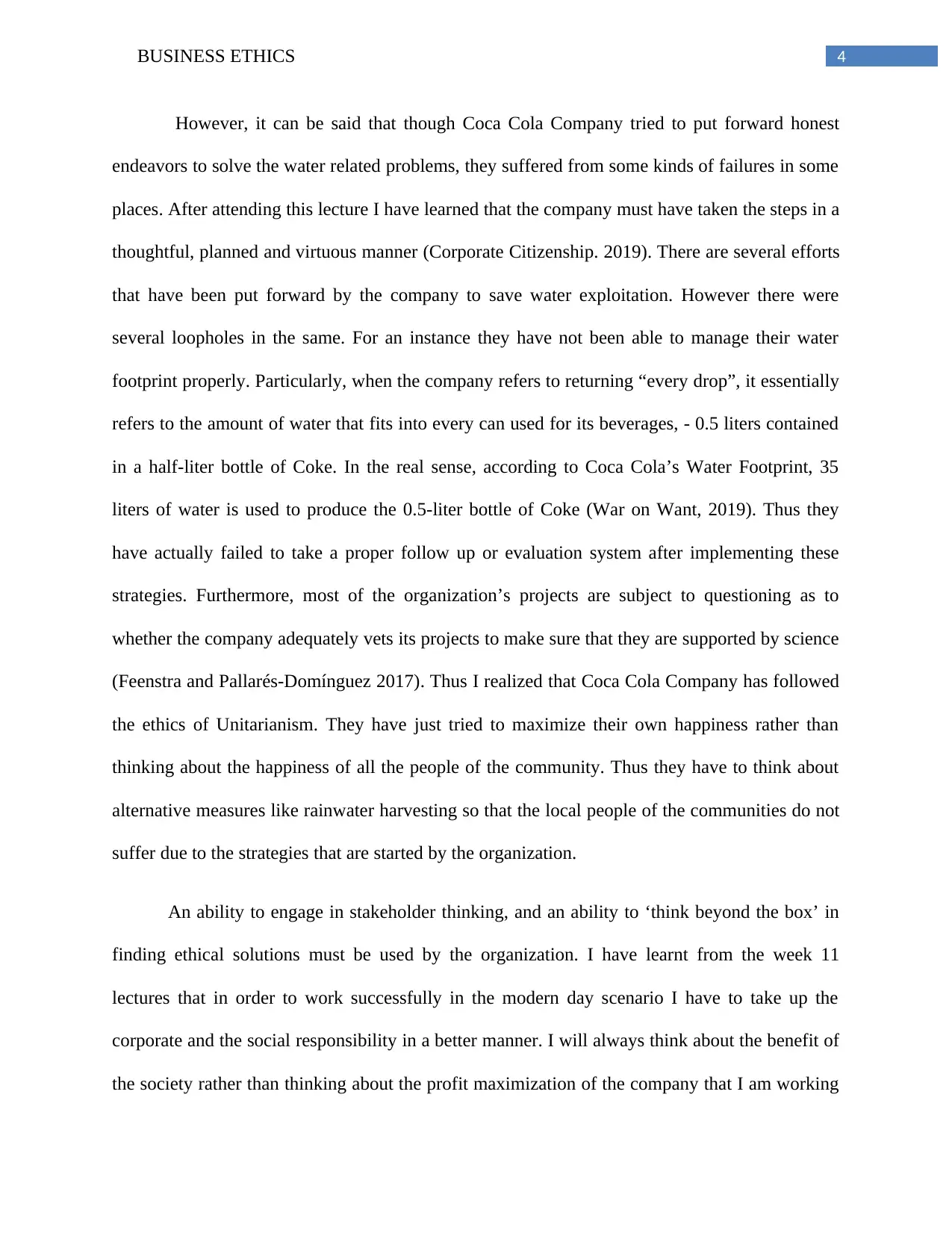
4BUSINESS ETHICS
However, it can be said that though Coca Cola Company tried to put forward honest
endeavors to solve the water related problems, they suffered from some kinds of failures in some
places. After attending this lecture I have learned that the company must have taken the steps in a
thoughtful, planned and virtuous manner (Corporate Citizenship. 2019). There are several efforts
that have been put forward by the company to save water exploitation. However there were
several loopholes in the same. For an instance they have not been able to manage their water
footprint properly. Particularly, when the company refers to returning “every drop”, it essentially
refers to the amount of water that fits into every can used for its beverages, - 0.5 liters contained
in a half-liter bottle of Coke. In the real sense, according to Coca Cola’s Water Footprint, 35
liters of water is used to produce the 0.5-liter bottle of Coke (War on Want, 2019). Thus they
have actually failed to take a proper follow up or evaluation system after implementing these
strategies. Furthermore, most of the organization’s projects are subject to questioning as to
whether the company adequately vets its projects to make sure that they are supported by science
(Feenstra and Pallarés-Domínguez 2017). Thus I realized that Coca Cola Company has followed
the ethics of Unitarianism. They have just tried to maximize their own happiness rather than
thinking about the happiness of all the people of the community. Thus they have to think about
alternative measures like rainwater harvesting so that the local people of the communities do not
suffer due to the strategies that are started by the organization.
An ability to engage in stakeholder thinking, and an ability to ‘think beyond the box’ in
finding ethical solutions must be used by the organization. I have learnt from the week 11
lectures that in order to work successfully in the modern day scenario I have to take up the
corporate and the social responsibility in a better manner. I will always think about the benefit of
the society rather than thinking about the profit maximization of the company that I am working
However, it can be said that though Coca Cola Company tried to put forward honest
endeavors to solve the water related problems, they suffered from some kinds of failures in some
places. After attending this lecture I have learned that the company must have taken the steps in a
thoughtful, planned and virtuous manner (Corporate Citizenship. 2019). There are several efforts
that have been put forward by the company to save water exploitation. However there were
several loopholes in the same. For an instance they have not been able to manage their water
footprint properly. Particularly, when the company refers to returning “every drop”, it essentially
refers to the amount of water that fits into every can used for its beverages, - 0.5 liters contained
in a half-liter bottle of Coke. In the real sense, according to Coca Cola’s Water Footprint, 35
liters of water is used to produce the 0.5-liter bottle of Coke (War on Want, 2019). Thus they
have actually failed to take a proper follow up or evaluation system after implementing these
strategies. Furthermore, most of the organization’s projects are subject to questioning as to
whether the company adequately vets its projects to make sure that they are supported by science
(Feenstra and Pallarés-Domínguez 2017). Thus I realized that Coca Cola Company has followed
the ethics of Unitarianism. They have just tried to maximize their own happiness rather than
thinking about the happiness of all the people of the community. Thus they have to think about
alternative measures like rainwater harvesting so that the local people of the communities do not
suffer due to the strategies that are started by the organization.
An ability to engage in stakeholder thinking, and an ability to ‘think beyond the box’ in
finding ethical solutions must be used by the organization. I have learnt from the week 11
lectures that in order to work successfully in the modern day scenario I have to take up the
corporate and the social responsibility in a better manner. I will always think about the benefit of
the society rather than thinking about the profit maximization of the company that I am working
Secure Best Marks with AI Grader
Need help grading? Try our AI Grader for instant feedback on your assignments.
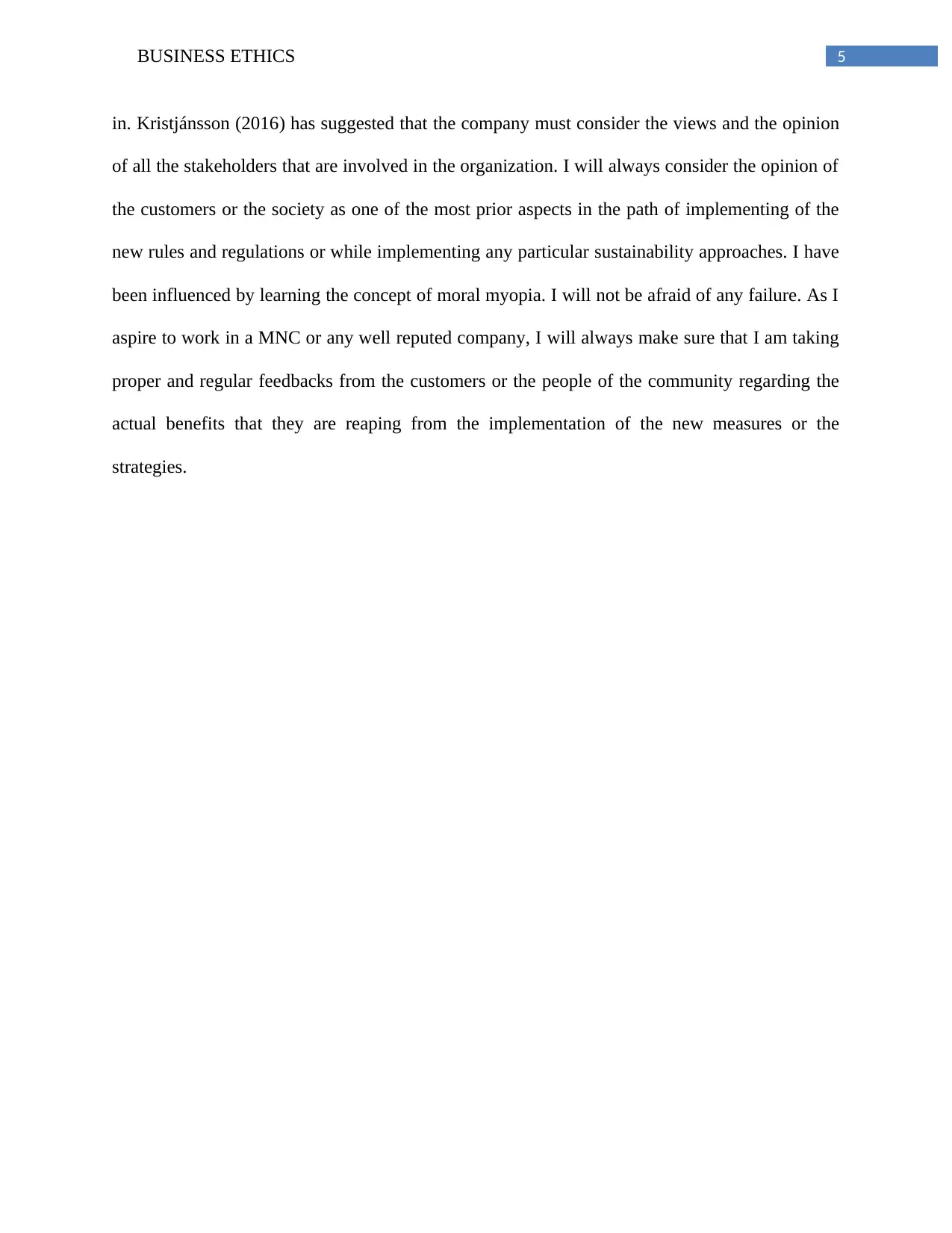
5BUSINESS ETHICS
in. Kristjánsson (2016) has suggested that the company must consider the views and the opinion
of all the stakeholders that are involved in the organization. I will always consider the opinion of
the customers or the society as one of the most prior aspects in the path of implementing of the
new rules and regulations or while implementing any particular sustainability approaches. I have
been influenced by learning the concept of moral myopia. I will not be afraid of any failure. As I
aspire to work in a MNC or any well reputed company, I will always make sure that I am taking
proper and regular feedbacks from the customers or the people of the community regarding the
actual benefits that they are reaping from the implementation of the new measures or the
strategies.
in. Kristjánsson (2016) has suggested that the company must consider the views and the opinion
of all the stakeholders that are involved in the organization. I will always consider the opinion of
the customers or the society as one of the most prior aspects in the path of implementing of the
new rules and regulations or while implementing any particular sustainability approaches. I have
been influenced by learning the concept of moral myopia. I will not be afraid of any failure. As I
aspire to work in a MNC or any well reputed company, I will always make sure that I am taking
proper and regular feedbacks from the customers or the people of the community regarding the
actual benefits that they are reaping from the implementation of the new measures or the
strategies.
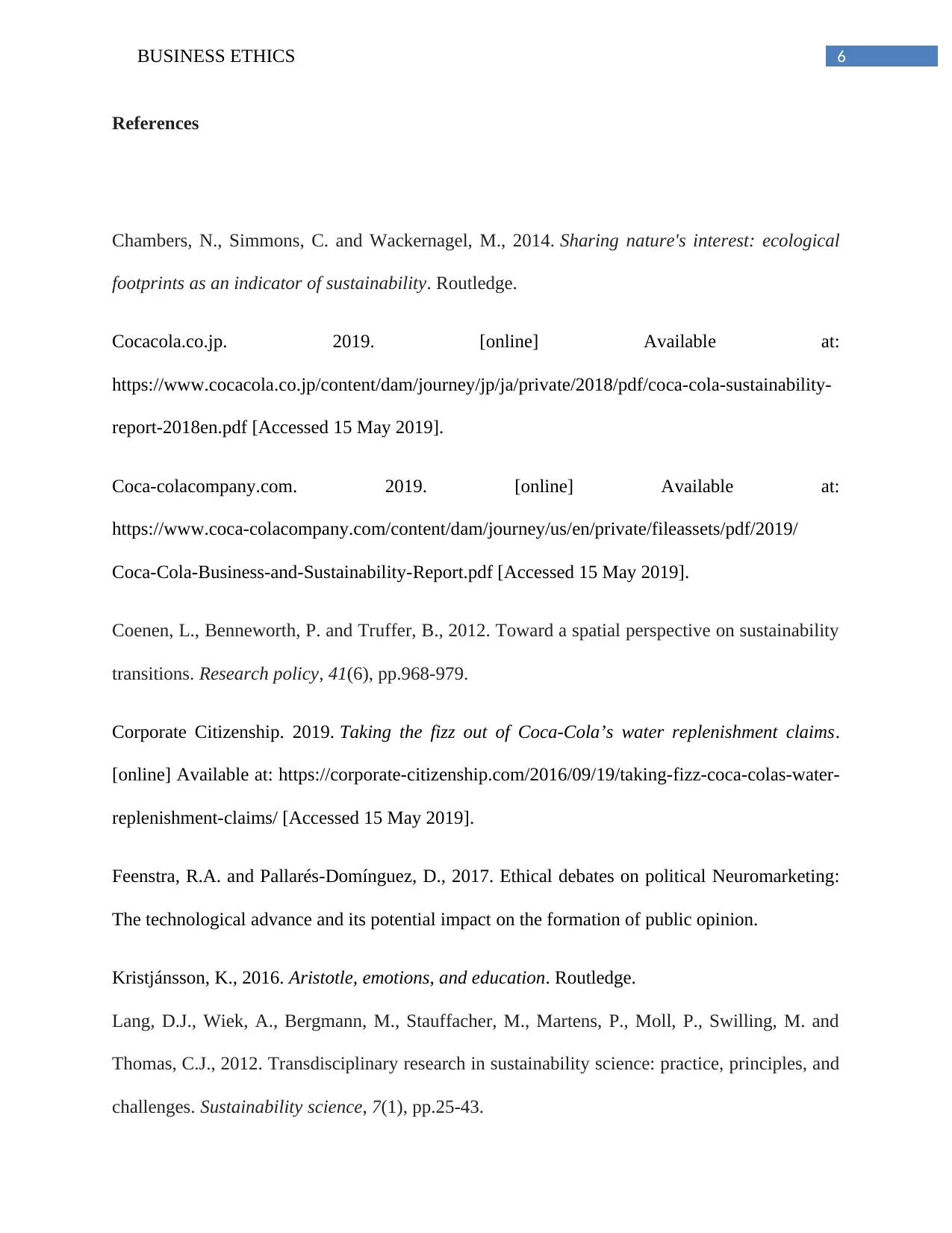
6BUSINESS ETHICS
References
Chambers, N., Simmons, C. and Wackernagel, M., 2014. Sharing nature's interest: ecological
footprints as an indicator of sustainability. Routledge.
Cocacola.co.jp. 2019. [online] Available at:
https://www.cocacola.co.jp/content/dam/journey/jp/ja/private/2018/pdf/coca-cola-sustainability-
report-2018en.pdf [Accessed 15 May 2019].
Coca-colacompany.com. 2019. [online] Available at:
https://www.coca-colacompany.com/content/dam/journey/us/en/private/fileassets/pdf/2019/
Coca-Cola-Business-and-Sustainability-Report.pdf [Accessed 15 May 2019].
Coenen, L., Benneworth, P. and Truffer, B., 2012. Toward a spatial perspective on sustainability
transitions. Research policy, 41(6), pp.968-979.
Corporate Citizenship. 2019. Taking the fizz out of Coca-Cola’s water replenishment claims.
[online] Available at: https://corporate-citizenship.com/2016/09/19/taking-fizz-coca-colas-water-
replenishment-claims/ [Accessed 15 May 2019].
Feenstra, R.A. and Pallarés-Domínguez, D., 2017. Ethical debates on political Neuromarketing:
The technological advance and its potential impact on the formation of public opinion.
Kristjánsson, K., 2016. Aristotle, emotions, and education. Routledge.
Lang, D.J., Wiek, A., Bergmann, M., Stauffacher, M., Martens, P., Moll, P., Swilling, M. and
Thomas, C.J., 2012. Transdisciplinary research in sustainability science: practice, principles, and
challenges. Sustainability science, 7(1), pp.25-43.
References
Chambers, N., Simmons, C. and Wackernagel, M., 2014. Sharing nature's interest: ecological
footprints as an indicator of sustainability. Routledge.
Cocacola.co.jp. 2019. [online] Available at:
https://www.cocacola.co.jp/content/dam/journey/jp/ja/private/2018/pdf/coca-cola-sustainability-
report-2018en.pdf [Accessed 15 May 2019].
Coca-colacompany.com. 2019. [online] Available at:
https://www.coca-colacompany.com/content/dam/journey/us/en/private/fileassets/pdf/2019/
Coca-Cola-Business-and-Sustainability-Report.pdf [Accessed 15 May 2019].
Coenen, L., Benneworth, P. and Truffer, B., 2012. Toward a spatial perspective on sustainability
transitions. Research policy, 41(6), pp.968-979.
Corporate Citizenship. 2019. Taking the fizz out of Coca-Cola’s water replenishment claims.
[online] Available at: https://corporate-citizenship.com/2016/09/19/taking-fizz-coca-colas-water-
replenishment-claims/ [Accessed 15 May 2019].
Feenstra, R.A. and Pallarés-Domínguez, D., 2017. Ethical debates on political Neuromarketing:
The technological advance and its potential impact on the formation of public opinion.
Kristjánsson, K., 2016. Aristotle, emotions, and education. Routledge.
Lang, D.J., Wiek, A., Bergmann, M., Stauffacher, M., Martens, P., Moll, P., Swilling, M. and
Thomas, C.J., 2012. Transdisciplinary research in sustainability science: practice, principles, and
challenges. Sustainability science, 7(1), pp.25-43.
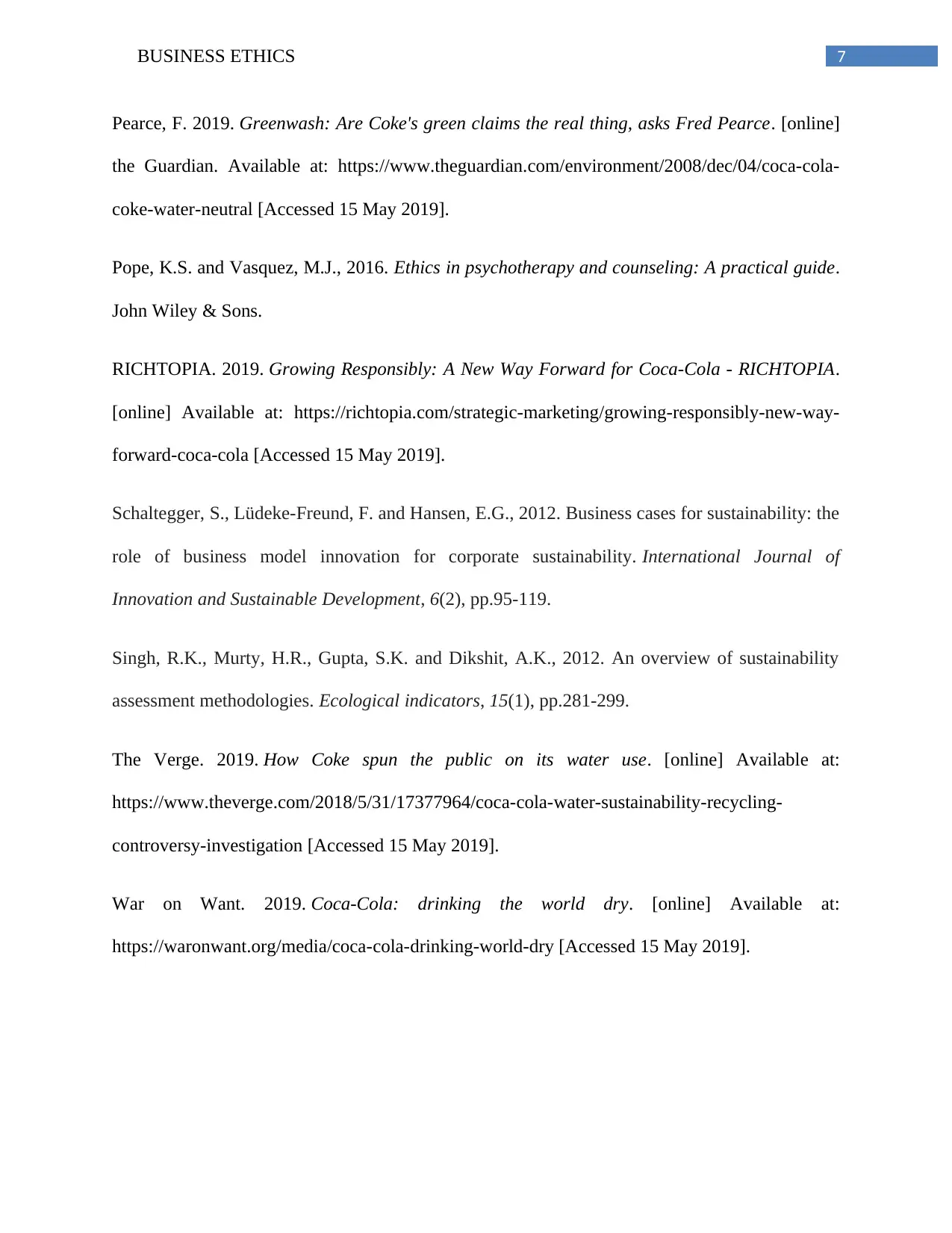
7BUSINESS ETHICS
Pearce, F. 2019. Greenwash: Are Coke's green claims the real thing, asks Fred Pearce. [online]
the Guardian. Available at: https://www.theguardian.com/environment/2008/dec/04/coca-cola-
coke-water-neutral [Accessed 15 May 2019].
Pope, K.S. and Vasquez, M.J., 2016. Ethics in psychotherapy and counseling: A practical guide.
John Wiley & Sons.
RICHTOPIA. 2019. Growing Responsibly: A New Way Forward for Coca-Cola - RICHTOPIA.
[online] Available at: https://richtopia.com/strategic-marketing/growing-responsibly-new-way-
forward-coca-cola [Accessed 15 May 2019].
Schaltegger, S., Lüdeke-Freund, F. and Hansen, E.G., 2012. Business cases for sustainability: the
role of business model innovation for corporate sustainability. International Journal of
Innovation and Sustainable Development, 6(2), pp.95-119.
Singh, R.K., Murty, H.R., Gupta, S.K. and Dikshit, A.K., 2012. An overview of sustainability
assessment methodologies. Ecological indicators, 15(1), pp.281-299.
The Verge. 2019. How Coke spun the public on its water use. [online] Available at:
https://www.theverge.com/2018/5/31/17377964/coca-cola-water-sustainability-recycling-
controversy-investigation [Accessed 15 May 2019].
War on Want. 2019. Coca-Cola: drinking the world dry. [online] Available at:
https://waronwant.org/media/coca-cola-drinking-world-dry [Accessed 15 May 2019].
Pearce, F. 2019. Greenwash: Are Coke's green claims the real thing, asks Fred Pearce. [online]
the Guardian. Available at: https://www.theguardian.com/environment/2008/dec/04/coca-cola-
coke-water-neutral [Accessed 15 May 2019].
Pope, K.S. and Vasquez, M.J., 2016. Ethics in psychotherapy and counseling: A practical guide.
John Wiley & Sons.
RICHTOPIA. 2019. Growing Responsibly: A New Way Forward for Coca-Cola - RICHTOPIA.
[online] Available at: https://richtopia.com/strategic-marketing/growing-responsibly-new-way-
forward-coca-cola [Accessed 15 May 2019].
Schaltegger, S., Lüdeke-Freund, F. and Hansen, E.G., 2012. Business cases for sustainability: the
role of business model innovation for corporate sustainability. International Journal of
Innovation and Sustainable Development, 6(2), pp.95-119.
Singh, R.K., Murty, H.R., Gupta, S.K. and Dikshit, A.K., 2012. An overview of sustainability
assessment methodologies. Ecological indicators, 15(1), pp.281-299.
The Verge. 2019. How Coke spun the public on its water use. [online] Available at:
https://www.theverge.com/2018/5/31/17377964/coca-cola-water-sustainability-recycling-
controversy-investigation [Accessed 15 May 2019].
War on Want. 2019. Coca-Cola: drinking the world dry. [online] Available at:
https://waronwant.org/media/coca-cola-drinking-world-dry [Accessed 15 May 2019].
1 out of 7
Related Documents
Your All-in-One AI-Powered Toolkit for Academic Success.
+13062052269
info@desklib.com
Available 24*7 on WhatsApp / Email
![[object Object]](/_next/static/media/star-bottom.7253800d.svg)
Unlock your academic potential
© 2024 | Zucol Services PVT LTD | All rights reserved.





